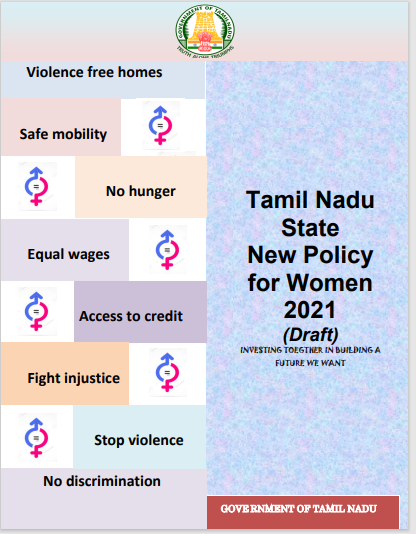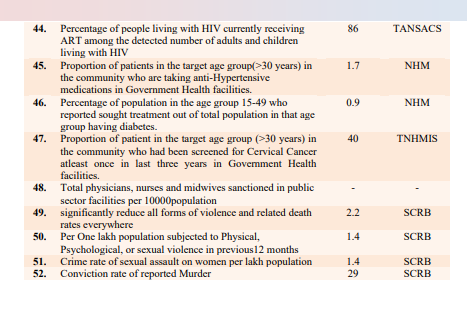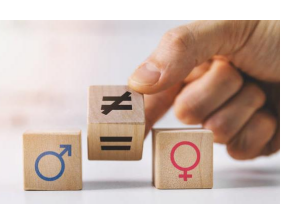PREVIOUS
Tamil Nadu State New Draft Policy for Women
May 17 , 2023
610 days
8179
0
(இதன் தமிழ் வடிவத்திற்கு இங்கே சொடுக்கவும்)
- Women's empowerment can be said to encompass five aspects: improving women's sense of self-worth; their right to have and determine choices in matters that concern them; their right to have access to opportunities and resources; their right to have the power to control their own lives, both within and outside the home; and their ability to influence their environment to ensure social justice and create an equitable social and economic order.

Present Scenario
- Tamil Nadu has the second-largest State economy in the country, with strong and consistent economic growth averaging about 8.5% since fiscal year (FY) 2006.
- Women’s contribution in the paid economy is significant – female labour force participation rate (FLFPR) in the state is higher than the average recorded for India.
- The rural FLFPR for Tamil Nadu is 35.1%, which is 15.4% higher than the national figure. Urban FLFPR in TN is 23.6% that is 7.5% higher than all of India average.
- Though, women’s effective participation in the workforce and their transition to formal employment opportunities continues to remain a challenge.
- Rate of Crimes against women per every 100000 female populations was 14.6 in 2019-20
- Conviction rate of crime against women was 18.3 in 2019-20.
- Per Lakh women that have been subjected to dowry offences during the year 4.3 in 2019-20.
- Conviction rate of women subject to dowry related offences is 7.7 (refer annexure for detailed data.

Vision
- Tamil Nadu would provide all women with access to all services and entitlements in an equitable manner, reduce discrimination and eliminate all forms of violence against women and provide them with equal opportunities for realizing their potential and aspirations.
Mission
- Tamil Nadu would provide a safe, secure, healthy and aspirational environment to empower 3.2 crore women population in the State, through an operational convergence amongst departments thus bringing improvement in the development outcomes for women involving both the genders to work towards the common goal.

Guiding principles
- Enhancing access to all services - health, education, employment, skilling and training.
- Enabling environments that restructure gender norms and behaviour linked changes that would consider the aspirations, expectations and attitudes of all.
- Empowering women and preparing from the adolescent stage their entry and transition to high end opportunities in high growth sectors.
- Elimination of violence against women and build on a comprehensive and integrated framework that would have zero tolerance to any kind of discrimination and violence against women and girls.

Core Objectives
- The policy would be implemented over a period of 5 years and aims to:
- Improve the nutritional outcomes of adolescents while addressing anaemia and underweight by at least half. Bring additional 1 crore women into the SHG fold. At least 1,00,000 women enterprises would be formed by graduating from livelihoods through intensive mentoring and extensive networking and handholding through mentors.
- Bridge the Digital gender Gap among women by increased internet accessibility and availability in both urban and rural areas.
- To facilitate data driven and evidence-based policy making, all Departments shall be committed to provide gender disaggregated data annually.
- Decrease dropouts by 10% every year in secondary and by increasing tertiary enrolment rates of girl students by 5% every year.
- Support to at least 1000 women Student researchers every year especially in STEM from amongst disadvantaged sections of society.
- Reach out to 10,000 women to reduce the skill gap with the appropriate technology training to allow for lateral entry at the mid-career level - second career entry for women who have quit their career for raising family or mobility issues.
- Enhance Institutional credit access and availability to women in need through establishment of Women’s Bank.
- Improve self-worth of women through increased confidence levels by training all school and College students in martial arts. All schools, colleges and other institutions shall ensure non-discrimination of gender and move towards gender equality.
- Promote entrepreneurship and innovation, inclusive targeting to handhold and mentor 1 lakh women owned enterprises.
- Increased women's participation in workforce leading to 40% share of state GSDP.
- Provide safe and women friendly public spaces and work spaces including Government Departments with a functional Internal Complaints Committee and Local Complaints Committee with regular third-party gender safety audit.
- Ensure filing of FIRs and reporting within 24 hours of the crime incident coming to light.
- Establish a system of Victim support to all cases of abuse that focuses on rehabilitation and identity protection at the first instance without delay to ensure that women do not feel abandoned.
- Make available support systems for women at every 10km radius who are in need of emotional support mechanisms.
- All women Headed Households in Tamil Nadu would be covered under social security schemes based on their requirement.
- Improve sex ratio at birth in Tamil Nadu the best in India.
- Encourage private, public sector listed companies, quasi government organizations, boards to provide 50% women in leadership positions.
- To encourage women to participate in political space without hindrance a finishing school to learn the basics of polity and various acts and provisions would be set up.
- Strengthen women grievance redressal through a direct phone-in programme with the hon’ble Chief minister would be conducted once in six months.
Implementation strategies
- The core focus areas of empowerment would be based on the guiding principles stated above thus optimizing opportunities, leveraging on current strengths, and hinging on collaboration between key stakeholders.
- The four pillars of empowerment upon which the guiding principles of the policy would be based are:
1. Social
- Social empowerment of women is to be understood as the process of developing a sense of autonomy and self-confidence, and acting individually and collectively to change social relationships and the institutions and discourses that exclude women especially the poorest of the poor and keep them in poverty.
- Tamil Nadu shall provide free/subsidized coaching classes for exams like JEE, CAT, UPSC, TNPSC and for higher management and technical courses to encourage women’s participation.
- Safety and sanitary audit shall be conducted to arrest the phenomenon of child marriage so that the conditions responsible for safety such as threats of abuse and violence on the way to school.
- Adolescent friendly health clinics (AFHCs) shall be established and use of such clinics to be transformed into health promotion hubs, to address adolescent health issues comprehensively beyond Adolescent Reproductive and Sexual Health.
- Differently abled women would have the right to exercise reproductive and sexual health choices including the right to have children if they so desire.
- The State shall provide victim/witness protection programmes to support affected women as the situation demands and as per predesigned Standard Operating Protocols.
- All single and women-headed households may be given 50 additional person-days of employment under MGNREGS.
- The State shall ensure in consultation with the judicial body on fast tracking of cases related to Gender Based violence (GBV).
- Laws and rights related to women shall be projected by the media to create awareness.
- De-addiction centers shall be set up with all facilities providing state of art treatment and rehabilitation facilities.
2. Economic
- Women shall share an equal proportion of seats in management committees for exercising forest rights in the Scheduled Tribes and Other Traditional Forest Dwellers (Recognition of Forest Rights) Act 2007.
- Women farmers and agricultural labourers shall have access to use minor forest produce and firewood.
- Traditional Women knowledge on conservation practices shall be recognized and integrated into the schemes of forest protection and conservation.
- Priorities shall be given for women’s cooperatives in the areas of leasing in or sale of uncultivated lands.
- Occupational segregation and gender pay gap shall be reduced by 50%.
- Hand Holding and mentoring shall be provided by the State to all the targeted 1 lakh women entrepreneurs by Industry experts.
- Government can help setting up kid/women care modules if an establishment has 50 plus women working there. This will be helpful for meme.
- Compulsory off for 2 days per week for women.
3. Political
- The state shall strive to “establish a society with no place for dominance” a gender-neutral society where women shall have equal rights in socio-political, economic and cultural and property.
- Registered political parties to provide 33.3% women representation horizontally and vertically.
- To provide minimum 33.3 % of seats to women through reservation at Assembly and Parliament elections as the State has already provided 50% reservation for women in Local Bodies.
- The State shall improve the basic infrastructure of the offices of Local Bodies to be gender friendly or at least gender neutral.
4.Emotional
- The policy aims to touch upon Psychological or Emotional empowerment of girls and women.
- It includes independence, informed decision-making ability, and Positive self-evolution.
- Mental health is a highly gendered issue, with depression twice as prevalent amongst women, and low-income women in particular.
- A community-based intervention combined with the District Mental Health Programme shall be initiated.
- The State shall follow a systematic approach to provide requisite screening, care and treatment especially at primary level - the Local Bodies with close coordination with the community-based organizations.
- State shall enhance the competence of primary health care providers to recognize and treat mental health consequences of domestic violence, sexual abuse, and acute and chronic stress in women.
- Primary Health centers shall be trained to deal with Gender based Violence and report first instance of violence to the concerned police officials.
Conclusion
- This Policy is valid for a period of 10 years from the date of its notification or till a new policy is formulated.
- However, amendments in this policy could be made with the approval of cabinet without affecting the beneficiaries already covered under the policy.
- This policy shall be reviewed after five years.
-------------------------------------
Leave a Reply
Your Comment is awaiting moderation.


